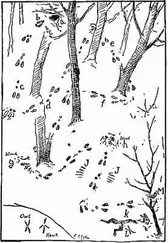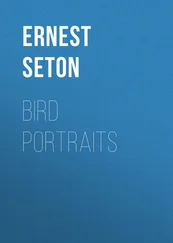Ernest Seton - Wild Animals I Have Known
Здесь есть возможность читать онлайн «Ernest Seton - Wild Animals I Have Known» весь текст электронной книги совершенно бесплатно (целиком полную версию без сокращений). В некоторых случаях можно слушать аудио, скачать через торрент в формате fb2 и присутствует краткое содержание. Год выпуска: 2001, Жанр: Природа и животные, на английском языке. Описание произведения, (предисловие) а так же отзывы посетителей доступны на портале библиотеки ЛибКат.
- Название:Wild Animals I Have Known
- Автор:
- Жанр:
- Год:2001
- ISBN:нет данных
- Рейтинг книги:5 / 5. Голосов: 1
-
Избранное:Добавить в избранное
- Отзывы:
-
Ваша оценка:
- 100
- 1
- 2
- 3
- 4
- 5
Wild Animals I Have Known: краткое содержание, описание и аннотация
Предлагаем к чтению аннотацию, описание, краткое содержание или предисловие (зависит от того, что написал сам автор книги «Wild Animals I Have Known»). Если вы не нашли необходимую информацию о книге — напишите в комментариях, мы постараемся отыскать её.
Wild Animals I Have Known — читать онлайн бесплатно полную книгу (весь текст) целиком
Ниже представлен текст книги, разбитый по страницам. Система сохранения места последней прочитанной страницы, позволяет с удобством читать онлайн бесплатно книгу «Wild Animals I Have Known», без необходимости каждый раз заново искать на чём Вы остановились. Поставьте закладку, и сможете в любой момент перейти на страницу, на которой закончили чтение.
Интервал:
Закладка:
They played about, basking in the sun, or wrestling with each other till a slight sound made them scurry under ground. But their alarm was needless, for the cause of it was their mother; she stepped from the bushes bringing another hen—number seventeen as I remember. A low call from her and the little fellows came tumbling out. Then began a scene that I thought charming, but which my uncle would not have enjoyed at all.
They rushed on the hen, and tussled and fought with it, and each other, while the mother, keeping a sharp eye for enemies, looked on with fond delight. The expression on her face was remarkable. It was first a grinning of delight, but her usual look of wildness and cunning was there, nor were cruelty and nervousness lacking, but over all was the unmistakable look of the mother's pride and love.
The base of my tree was hidden in bushes and much lower than the knoll where the den wash So I could come and go at will without scaring the foxes.
For many days I went there and saw much of the training of the young ones. They early learned to turn to turn to statuettes sound, and then on hearing it again or finding other cause for fear, to run for shelter.
Some animals have so much mother-love that it over flows and benefits outsiders. Not so old Vixen it would seem. Her pleasure in the cubs led to most refined cruelty. For she often brought home to them mice and birds alive, and with diabolic gentleness would avoid doing them serious hurt so that the cubs might have larger scope to torment them.
There was a woodchuck that lived over in the hill orchard. He was neither handsome nor interesting, but he knew how to take care of himself. He had dug a den between the roots of an old pine stump, so that the foxes could not follow him by digging. But hard work was not their way of life; wits they believed worth more then elbowgrease. This woodchuck usually sunned himself on the stump each morning. If he saw a fox near he went down in the door of his den, or if the enemy was very near he went inside and stayed long enough for the danger to pass.
One morning Vixen and her mate seemed to decide that it was time the children knew something about the broad subject of Woodchucks, and further that this orchard woodchuck would serve nicely for an object-lesson. So they went together to the orchard-fence unseen by old Chuckie on his stump. Scarface then showed himself in the orchard and quietly walked in a line so as to pass by the stump at a distance, but never once turned his head or allowed the ever-watchful woodchuck to think himself seen. When the fox entered the field the woodchuck quietly dropped down to the mouth of his den: here he waited as the fox passed, but concluding that after all wisdom is the better part, went into his hole.
This was what the foxes wanted. Vixen had kept out of sight, but now ran swiftly to the stump and hid behind it. Scarface had kept straight on, going very slowly. The woodchuck had not been frightened, so before long his head popped up between the roots and he looked around. There was that fox still going on, farther and farther away. The woodchuck grew bold as the fox went, and came out farther, and then seeing the coast clear, he scrambled onto the stump, and with one spring Vixen had him and shook him till he lay senseless. Scarface had watched out of the corner of his eye and now came running back. But Vixen took the chuck in her jaws and made for the den, so he saw he wasn't needed.
Back to the den came Vix, and carried the chuck so carefully that he was able to struggle a little when she got there. A low 'woof' at the den brought the little fellows out like schoolboys to play. She threw the wounded animal to them and they set on him like four little furies, uttering little growls and biting little bites with all the strength of their baby jaws, but the woodchuck fought for his life and beating them off slowly hobbled to the shelter of a thicket. The little ones pursued like a pack of hounds and dragged at his tail and flanks, but could not hold him back. So Vixen overtook him with a couple of bounds and dragged him again into the open for the children to worry. Again and again this rough sport went on till one of the little ones was badly bitten, and his squeal of pain roused Vix to end the woodchuck's misery and serve him up at once.
Not far from the den was a hollow overgrown with coarse grass, the playground of a colony of field-mice. The earliest lesson in woodcraft that the little ones took, away from the den, was in this hollow. Here they had their first course of mice, the easiest of all game. In teaching, the main thing was example, aided by a deep-set instinct. The old fox, also, had one or two signs meaning "lie still and watch," "come, do as I do," and so on, that were much used.
So the merry lot went to this hollow one calm evening and Mother Fox made them lie still in the grass. Presently a faint squeak showed that the game was astir. Vix rose up and went on tiptoe into the grass—not crouching but as high as she could stand, sometimes on her hind legs so as to get a better view. The runs that the mice follow are hidden under the grass tangle, and the only way to know the whereabouts of a mouse is by seeing the slight shaking of the grass, which is the reason why mice are hunted only on calm days.
And the trick is to locate the mouse and seize him first and see him afterward. Vix soon made a spring, and in the middle of the bunch of dead grass that she grabbed was a field-mouse squeaking his last squeak.
He was soon gobbled, and the four awkward little foxes tried to do the same as their mother, and when at length the eldest for the first time in his life caught game, he quivered with excitement and ground his pearly little milk-teeth into the mouse with a rush of inborn savageness that must have surprised even himself.
Another home lesson was on the red-squirrel. One of these noisy, vulgar creatures, lived close by and used to waste part of each day scolding the foxes, from some safe perch. The cubs made many vain attempts to catch him as he ran across their glade from one tree to an other, or spluttered and scolded at them a foot or so out of reach. But old Vixen was up in natural history—she knew squirrel nature and took the case in hand when the proper time came. She hid the children and lay down flat in the middle of the open glade. The saucy low-minded squirrel came and scolded as usual. But she moved no hair. He came nearer and at last right over head to chatter:
"You brute you, you brute you."
But Vix lay as dead. This was very perplexing, so the squirrel came down the trunk and peeping about made a nervous dash across the grass, to another tree, again to scold from a safe perch.
"You brute you, you useless brute, scarrr-scarrrr."
But flat and lifeless on the grass lay Vix. This was most tantilizing to the squirrel. He was naturally curious and disposed to be venturesome, so again he came to the ground and scurried across the glade nearer than before. Still as death lay Vix, "surely she was dead." And the little foxes began to wonder if their mother wasn't asleep.
But the squirrel was working himself into a little craze of foolhardy curiosity. He had dropped a piece of bark on Vix's head, he had used up his list of bad words and he had done it all over again, without getting a sign of life. So after a couple more dashes across the glade he ventured within a few feet of the really watchful Vix, who sprang to her feet and pinned him in a twinkling.
"And the little ones picked the bones e-oh."
Thus the rudiments of their education were laid, and afterward as they grew stronger they were taken farther afield to begin the higher branches of trailing and scenting.
For each kind of prey they were taught a way to hunt, for every animal has some great strength or it could not live, and some great weakness or the others could not live. The squirrel's weakness was foolish curiosity; the fox's that he can't climb a tree. And the training of the little foxes was all shaped to take advantage of the weakness of the other creatures and to make up for their own by defter play where they are strong.
Читать дальшеИнтервал:
Закладка:
Похожие книги на «Wild Animals I Have Known»
Представляем Вашему вниманию похожие книги на «Wild Animals I Have Known» списком для выбора. Мы отобрали схожую по названию и смыслу литературу в надежде предоставить читателям больше вариантов отыскать новые, интересные, ещё непрочитанные произведения.
Обсуждение, отзывы о книге «Wild Animals I Have Known» и просто собственные мнения читателей. Оставьте ваши комментарии, напишите, что Вы думаете о произведении, его смысле или главных героях. Укажите что конкретно понравилось, а что нет, и почему Вы так считаете.





